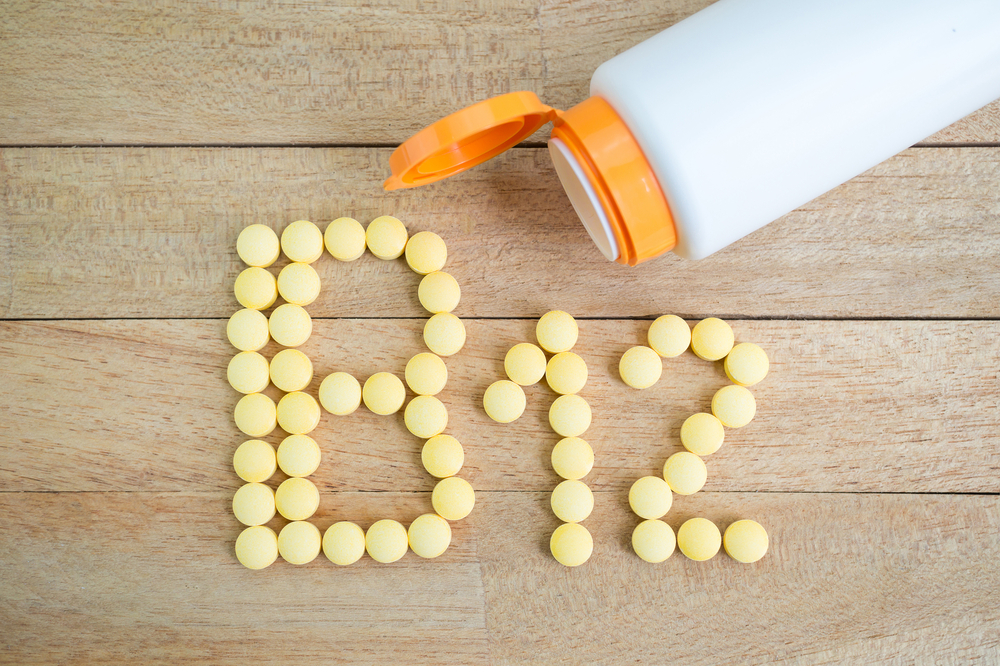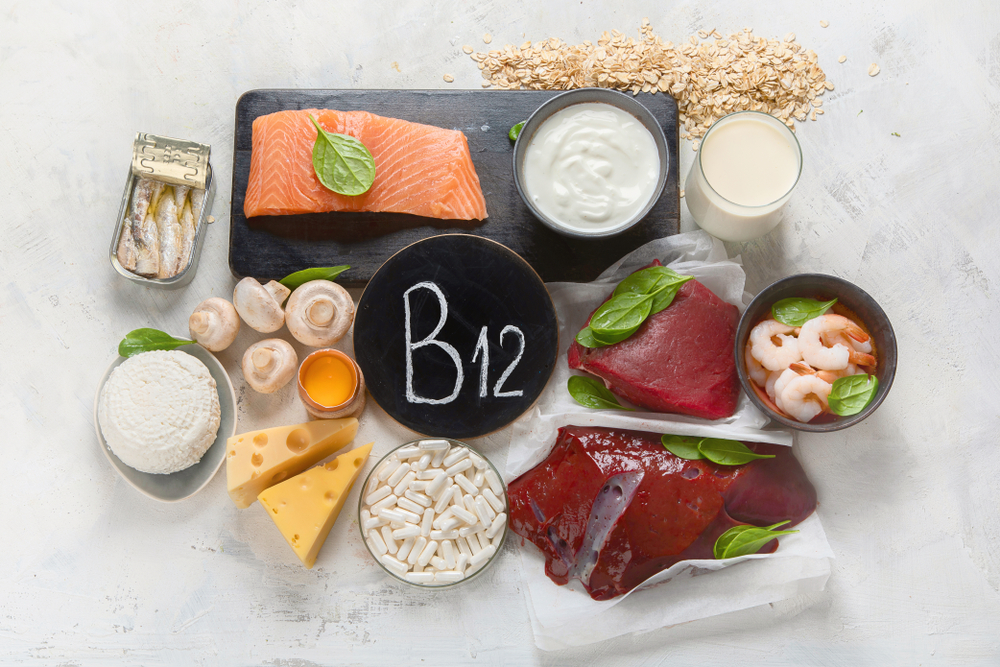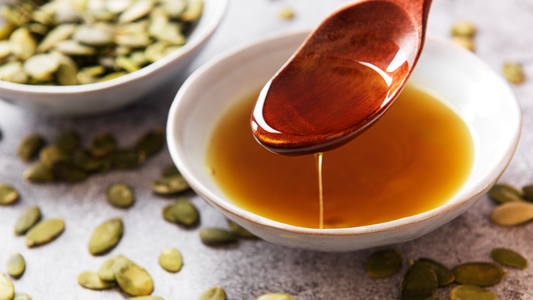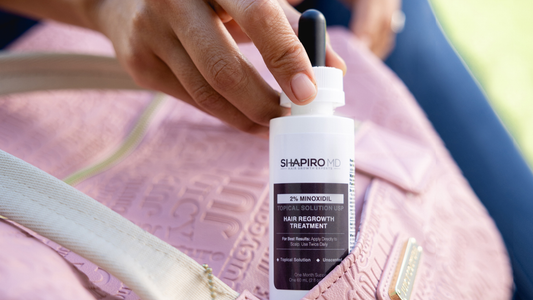Good nutrition is important for healthy hair growth, and research has shown a connection between low levels of vitamin B12 and hair loss.
Although vitamin B12 deficiencies are rare in the U.S., certain medications and health conditions such as pernicious anemia can affect the absorption of vitamin B12 and contribute to a deficiency. Older people and vegetarians or vegans are also more likely to develop a vitamin B12 deficiency.
In this article, we’ll go into detail about vitamin B12, all that it does for your body, why you need it, and how you can ensure your vitamin B12 intake is adequate.
Summary
- Vitamin B12 is one of many essential vitamins for keeping your hair and body healthy.
- Hair loss has many possible causes, but if your hair loss is linked to a vitamin B12 deficiency, you can restore hair growth by increasing your B12 levels.
- You can raise your vitamin B levels by consuming more animal-based foods, fortified foods, or vitamin supplements. Other vitamins — especially B-complex vitamins — are essential for preventing hair breakage and keeping your hair healthy.
What Is Vitamin B12?
Also known as cobalamin, vitamin B12 is essential for the formation of red blood cells and DNA.
Red blood cells carry oxygen around the body and help us to break down food and turn it into energy. Vitamin B12 is involved in the development of brain and nerve cells, and it reduces the risk of birth defects.
Because vitamin B12 is naturally found in animal products, a diet low in meat and dairy can increase the risk of a deficiency.

Why Do I Need Vitamin B12?
All vitamins and minerals are responsible for overall health and mental well-being, and vitamin B12 is no exception.
Vitamin B12 is part of the vitamin B-complex range, which is a class of water-soluble vitamins essential for cell growth and development.
Vitamin B supports the immune system and guards against infections, too.
What are the health benefits of vitamin B12?
The body requires vitamin B12 for a variety of functions, including:
- Maintaining healthy eyesight.
- Keeping your bones strong.
- Maintaining gut health and avoiding gastrointestinal issues, such as constipation.
- Increasing your energy levels.
- Preventing anemia and heart disease.
- Decreasing the risk of birth defects in pregnant women.
- Supporting brain health and preventing nerve problems.
- Maintaining healthy hair, skin, and nails.
Vitamin B12 Benefits for Hair: What’s the Link Between Vitamin B12 and Hair Loss?
Vitamin B12 is required to produce healthy red blood cells that transport oxygen around the body. All bodily tissues — including the scalp — require oxygen to break down glucose and produce energy to carry out their functions. Blood cells supply hair follicles with enough oxygen and the right nutrients that are essential for healthy hair.
Vitamin B12 helps promote hair growth by improving blood circulation to the scalp.
Vitamin B12 also supports and maintains healthy hair, skin, and nails. Vitamin B12 deficiencies have been linked to [anemia](https://www.nhs.uk/conditions/vitamin-b12-or-folate-deficiency-anaemia/#:~:text=Vitamin%20B12%20or%20B9%20(commonly,using%20a%20substance%20called%20haemoglobin.), which is a condition characterized by low iron levels.
When the body doesn’t have enough iron, all sorts of problems occur—including hair loss and hair thinning.
When used in conjunction with other B vitamins, vitamin B12 is even more effective for hair growth—we’ll take a closer look at this later.

What Happens If I Have a Vitamin B12 Deficiency?
Vitamin B12 deficiencies are characterized by:
- Muscle weakness or fatigue
- Digestive problems
- Nervous system disorders
- Heart damage
Most people get enough vitamin B12 just by eating a diet that includes animal products.
Vitamin B12 is stored in the liver, so if you stop consuming foods that contain this vitamin—for example, if you adopt a vegan or vegetarian lifestyle—it can actually take between 3 and 5 years before the body uses up its supply of vitamin B12!
What Are Some Factors That Increase the Chances of Vitamin B12 Deficiency?
Certain risk factors can make you more prone to developing a B12 deficiency. Some factors can be managed or eliminated, while others are beyond your control.
Some risk factors for vitamin B12 deficiency include:
- Old age
- Atrophic gastritis (a condition that damages the stomach lining)
- Certain health conditions and medications
- A vegan or vegetarian diet
How Do I Know If My Vitamin B12 Levels Are Low?
You may not experience symptoms if you have a vitamin B12 deficiency right away; it can take years for the affects to manifest as symptoms. However, vitamin B12 deficiency is serious as it can lead to anemia and worse when left untreated.
Symptoms of vitamin B12 deficiency
- Weakness or lack of energy.
- Bleeding gums or mouth ulcers.
- Numbness or tingling sensations in the hands and feet.
- Hair thinning or hair loss.
- Heart palpitations or increased heart rate.
- Irritability.
- Loss of appetite and/or weight loss.
- Nausea.
- Gastrointestinal issues.
- Depression.
- Difficulty balancing.
- Confusion or poor memory.

Do a vitamin B12 test
If you suspect your vitamin B12 levels are low, or you’re worried about nutritional deficiencies after adopting a vegan diet, you can do a urine or blood test to check your vitamin b12 levels.
Visit your doctor and have them perform the test or purchase a kit online and do the test at home.
Food for Thought: What Other Vitamin Deficiencies Can Cause Hair Loss?
A well-balanced diet is essential for overall health, so it's no surprise that you need more than vitamin B12 for strong hair follicles and healthy hair. To ensure healthy hair growth, you'll also need:
Vitamin D. Zinc. Selenium. Riboflavin. Biotin. Folate.
What Can I Do If I Have a Vitamin B12 Deficiency?
Depending on the cause of your B12 deficiency, any of the following can help to increase your vitamin B12 levels:
Eat a diet rich in vitamin B12 foods
One of the easiest ways to ensure you get enough vitamin B12 is to eat the right foods, including:
- Chicken, beef, and liver.
- Seafood, such as clams, and fish like sardines, tuna, trout, and herring.
- Dairy products, like milk, cheese, and yogurt.
- Eggs.
- B12 fortified foods, such as cereals, nondairy milk, and nutritional yeast.
- Mushrooms—especially shiitake mushrooms.
- Spinach.
- Beetroot.
- Potatoes.

Food for Thought: What If I'm a Vegan or Vegetarian?
Animal-based foods contain the highest amount of vitamin B12, this is why vegans and vegetarians are often at risk of developing a deficiency.
Consuming fortified foods, such as vegan spreads, cereals, and meat substitutes can help, but vitamin supplements or B12 injections may work even better to correct B12 deficiencies.
Take vitamin supplements
If you’re unable to get your vitamin B12 from foods, you can use oral supplements to boost your vitamin B12 level.
Will vitamin B12 supplements help with hair loss?
Hair loss may be caused by several factors, so taking vitamin B12 supplements may not necessarily work for you.
However, if you already have low B12 levels—as determined by a urine or blood test—using B12 supplements or eating foods with vitamin B12 may be helpful.
Get vitamin B12 injections
Vitamin B12 shots can be very effective for treating a deficiency. You need a prescription to obtain a B12 injection, but they can be safely administered by a doctor or even at home.
B12 injections are typically given in the thigh, upper arm, or buttock.
People who should consider B12 injections include:
- Those with medical conditions like Crohn’s disease, lupus, and certain cancers.
- Older people who struggle to absorb B12.
- People with pernicious anemia, or those at risk of developing it.
- Vegans and vegetarians.
What other vitamins do I need?
If you’re looking at supplementing with vitamin B12, it’s also important to include the other B vitamins that comprise the vitamin B-complex—many of them boost cell rejuvenation and support hair follicle growth.
B vitamins to get in your diet include:
- B1 (thiamine): It helps to keep your muscles, nerves, and heart functioning. It also promotes healthy hair growth and protects hair follicles from damage.
- B2 (riboflavin): It helps to produce healthy red blood cells and helps the body use vitamins B6 and B3.
- B3 (niacin): It improves brain function and skin health, and reduces blood pressure. It also helps with hair growth by improving blood circulation.
- B5 (pantothenic acid): It helps produce red blood cells and sex hormones. It also helps build strong hair follicles and encourages healthy hair growth.
- B6 (pyridoxine): It improves mood and brain health, while treating and preventing conditions like anemia and possibly mental health conditions. It also improves hair growth by providing access to the amino acids required to build healthy hair.
- B7 (biotin): It aids metabolism, and it’s essential for a healthy pregnancy. Biotin also prevents hair loss and boosts hair follicle growth.
- B9 (folic acid): This vitamin helps the body produce new cells and prevents cell mutations that can lead to cancer. It’s also vital for preventing birth defects and prevents premature graying.
How to Prevent Vitamin B12 Deficiency
By eating a balanced diet that contains B12-rich foods, you can avoid developing a deficiency in the first place.
However, people on certain medications or those with specific diseases may not be able to absorb vitamin B12 effectively.
If you’re feeling unusually tired, your hair is thinning, or you experience any of the other symptoms mentioned above, it may make sense to get your vitamin levels tested.
A medical professional will then be able to guide the best course of treatment.
Where Can I Learn More about Vitamins for Hair Health?
Vitamins are essential for healthy hair growth and optimal physiological function, but it’s often difficult to consume all of the right nutrients given busy schedules and increasingly common diets/lifestyles.
If you suspect that a vitamin deficiency is causing your hair loss or thinning, ShapiroMD can help.
Not only have we developed a range of effective hair loss shampoos and serums, our team has also created hair-specific hairbiotics and supplements packed with essential vitamins and minerals, including B12 and selenium.
If you're concerned about a meaningul deficiences, talk to your doctor about your symptoms first.
Learn more and get started by clicking here.




